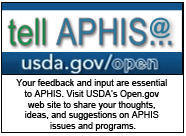Contact:
Lyndsay Cole (970) 494-7410
Lawrence Hawkins (916) 930-5509
Update from APHIS Regarding a Detection of Bovine Spongiform Encephalopathy (BSE) in the United States
On April 24, USDA's Animal and Plant Health Inspection Service confirmed the nation's 4th case of Bovine Spongiform Encephalopathy (BSE) in an animal that was sampled for the disease at a rendering facility in central California. This animal was never presented for slaughter for human consumption, so at no time presented a risk to the food supply, or to human health in the United States.
Through its continuing epidemiological investigation, APHIS--in collaboration with the California Department of Food and Agriculture (CDFA)--has identified that one progeny born to the positive cow in the last 2 years was stillborn, and another has been located on a site in another state. That animal has been appraised, humanely euthanized, and sampled for BSE at the National Veterinary Services Laboratories in Ames, Iowa. Test results for that animal are negative for BSE. No birth cohort cattle have been located through the investigation.
A hold order has been placed on all cattle at a second dairy (dairy 2) that is associated with the dairy of the initial positive cow (also called the index dairy). Both dairies remain under quarantine. Inventories of both the index dairy and dairy 2 have been completed by CDFA. Records are still being matched and validated to determine if any at-risk cattle may be present.
In addition, a calf ranch where the initial positive cow was raised 10 years ago is being investigated.
The Food and Drug Administration and CDFA continue the investigation of feed records at the index dairy, rendering facility and calf ranch. To date, 10 feed firms have been identified as suppliers for the index dairy during the time period of interest. At the rendering facility, feed investigators confirmed that all domestic distribution of meat and bone meal meets federal labeling requirements.
USDA will continue to work closely with CDFA and FDA to provide additional information as it is available.
The United States has a longstanding system of three interlocking safeguards against BSE that protects public and animal health in the United States, the most important of which is the removal of specified risk materials - or the parts of an animal that would contain BSE should an animal have the disease - from all animals presented for slaughter in the United States. The second safeguard is a strong feed ban that protects cattle from the disease. The third safeguard - which led to this detection - is our ongoing BSE surveillance program that allows USDA to detect the disease if it exists at very low levels in the U.S. cattle population.
#
Note to Reporters: USDA news releases, program announcements and media advisories are available on the Internet and through Really Simple Syndication (RSS) feeds. Go to the APHIS news release page at www.aphis.usda.gov/newsroom and click on the RSS feed link.
USDA is an equal opportunity provider, employer and lender. To file a complaint of discrimination, write: USDA, Director, Office of Civil Rights, 1400 Independence Ave., SW., Washington, DC 20250-9410 or call (800) 795-3272 (voice) or (202) 720-6382 (TDD).
